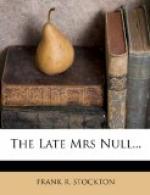“No,” said Mrs Keswick, “my breakfast was brought up-stairs to me.” And with that she turned and went out of the room. She closed the door behind her, but scarcely had she done so, when she opened it again and looked in. It was quite plain, to the two silent and astonished observers of her actions, that she was engaged in the occupation, very unusual with her, of controlling an excited condition of mind. She looked first at one, and then at the other, and then she said, in a voice which seemed to meet with occasional obstructions in its course: “I have nothing more to say about anything. Do just what you please, only don’t talk to me about it.” And she closed the door.
“What is the meaning of all this?” said Lawrence, advancing towards Annie. “What has come over her?”
“I am sure I don’t know,” said Annie, and with this she burst into tears, and cried as she would have scorned to cry, during the terrible storm of the day before.
That morning, Lawrence Croft was a very much puzzled man. What had happened to Mrs Keswick he could not divine, and at times he imagined that her changed demeanor was perhaps nothing but an artful cover to some new and more ruthless attack.
Annie took occasion to be with her aunt a good deal during the morning, but she reported to Lawrence that the old lady had said very little, and that little related entirely to household affairs.
Mrs Keswick ate dinner with them. Her manner was grave, and even stern; but she made a few remarks in regard to the weather and some neighborhood matters; and before the end of the meal both Lawrence and Annie fancied that they could see some little signs of a return to her usual humor, which was pleasant enough when nothing happened to make it otherwise. But expectations of an early return to her ordinary manner of life were fallacious; she did not appear at supper; and she spent the evening in her own room. Lawrence and Annie had thus ample opportunity to discuss this novel and most unexpected state of affairs. They did not understand it, but it could not fail to cheer and encourage them. Only one thing they decided upon, and that was that Lawrence could not go away until he had had an opportunity of fully comprehending the position, in relation to Mrs Keswick, in which he and Annie stood.
About the middle of the evening, as Lawrence was thinking that it was time for him to retire to his room in the little house in the yard, Letty came in with a letter which she said had been brought from Midbranch by a colored man on a horse; the man had said there was no answer, and had gone back to Howlett’s, where he belonged.
The letter was for Mr Croft and from Miss March. Very much surprised at receiving such a missive, Lawrence opened the envelope. His letter to Miss March had not yet been sent, for the new state of affairs had not only very much occupied his mind, but it also seemed to render unnecessary any haste in the matter, and he had concluded to mail the letter the next day. This, therefore, was not in answer to anything from him; and why should she have written?




